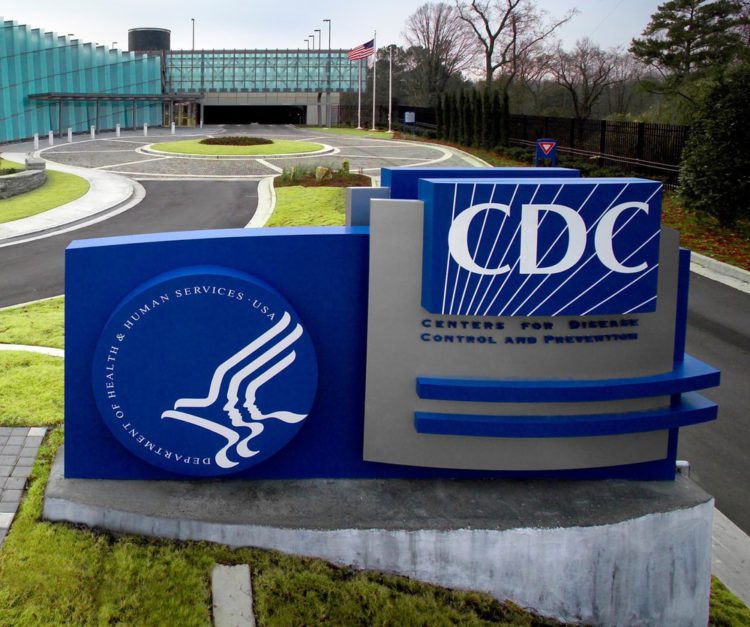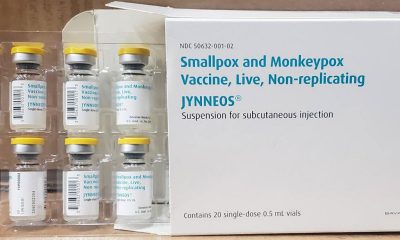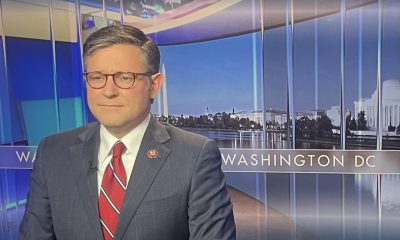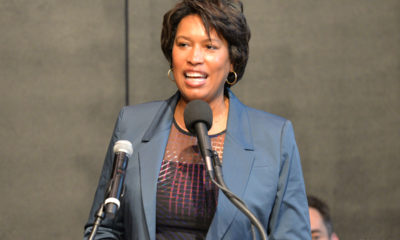The White House
CDC on monkeypox: ‘We anticipate an increase in cases in the coming weeks’

Rochelle Walensky, director of the Centers for Disease Control & Prevention, warned on Friday the spread of monkeypox, an outbreak that has occurred primarily among gay and bisexual men, would increase in the coming weeks.
“Now as we closely monitor cases, I would like you all to understand that we anticipate an increase in cases in the coming weeks,” Walensky said in a conference call with top Biden administration health officials and reporters.
The increase, Walensky said, is due to three factors: 1) The CDC streamlining its reporting process to allow states to report new cases more quickly and accurately; 2) With more cases in the United States, an increase in the resulting exposure of these cases in the coming weeks; and 3) A significant increase in the number of people seeking laboratory tests and the number of specimens being submitted for testing.
Monkeypox cases in the United States, Walensky said, have reached 1,470 reported cases documented across 44 jurisdictions as of July 14.
Younger gay and bisexual men are primarily affected: The median age is 36 with a range of 18 to 76 years of age, and the vast majority of cases happen among those who identify as men who have sex with men based on demographic information local health departments provided to CDC, Walensky said.
The Biden administration on the same day Walensky disclosed the new data announced an order for another 2.5 million doses of Bavarian Nordic’s JYNNEOS vaccine to respond to the current monkeypox outbreak.
The vaccines, however, won’t arrive soon: According to the Department of Health & Human Services, they’re coming in 2023 as part of the plan for the U.S. government’s available supply of vaccine to reach 7 million by mid-2023, which would be several months after the outbreak has begun.
The Biden administration has been faulted for moving too slowly in responding to monkeypox in criticism reminiscent of inaction during the coronavirus and HIV/AIDS epidemics, including being too slow to distribute vaccines and make testing available. Monkeypox is transmitted by skin-to-skin contact, unlike the other two diseases, and isn’t fatal.
Walensky during the call acknowledged “the demand for vaccines from jurisdictions is higher than our current available supply,” but pushed back on other criticisms as “points of confusion where we’ve been hearing from the public, our partners and media.” The availability of tests, for example, is and has been meeting capacity, Walensky said.
“We have the testing capacity needed,” Walensky said. “We expanded the nation’s monkeypox testing capacity this week, and now have four commercial labs with combined capabilities along with CDC laboratory Response Network … we’ve gone from being able to test 6,000 samples a week to 70,000 samples per week. Having commercial lab testing for monkeypox will also make it more convenient for providers to access tasks by using existing providers to lab relationships, and we have not yet received anywhere near that demand of tests as our capacity now permits.”
Also during the call health officials announced efforts to work on delivery of 786,000 doses currently located in Denmark, which they said will be available pending FDA clearance by the end of July. The inability of the Biden administration to move the vaccines from Europe in a timely fashion has been a source of criticism of the FDA.
Peter Marks, director of the Center for Biologics Evaluation & Research at the FDA, pushed back on that criticism in response to a question from the Washington Blade, insisting the FDA had taken a timely approach to obtaining those vaccines.
“First of all … quite contrary to missing a chance for approval, FDA actively reached out using contacts with the Biomedical Advanced Research & Development Authority to actually move up the submission that was necessary and all of the other events that were necessary to get those doses to be able to be used from what was originally going to be this fall,” Marks said. “And we did that actually, pretty shortly after we realized there was a monkeypox outbreak.”
Marks also said the United States was unable to rely on the European Union’s certification of the vaccines because the FDA relies on its own safety protocols for approval of medication for use domestically.
“We do not in the United States recognize — we don’t have mutual recognition of vaccine inspections for initial licensure from other countries, and that’s because we have our quality standards that have to be maintained,” Marks said. “And we have with all due diligence to make sure that the necessary procedures were undertaken, so that these will be available before the end of July but these doses were originally not scheduled to be approved until sometime in the fall, and that was moved up.”
The White House
White House does not ‘respond’ to reporters’ requests with pronouns included
Government workers were ordered not to self-identify their gender in emails

White House Press Secretary Karoline Leavitt and a senior advisor in the Department of Government Efficiency rejected requests from reporters who included their pronouns in the signature box of their emails, each telling different reporters at the New York Times that “as a matter of policy,” the Trump-Vance administration will decline to engage with members of the press on these grounds.
News of the correspondence between the journalists and the two senior officials was reported Tuesday by the Times, which also specified that when reached for comment, the White House declined to “directly say if their responses to the journalists represented a new formal policy of the White House press office, or when the practice had started.”
“Any reporter who chooses to put their preferred pronouns in their bio clearly does not care about biological reality or truth and therefore cannot be trusted to write an honest story,” Leavitt told the Times.
Department of Government Efficiency Senior Advisor Katie Miller responded, “I don’t respond to people who use pronouns in their signatures as it shows they ignore scientific realities and therefore ignore facts.”
Steven Cheung, the White House communications director, wrote in an email to the paper: “If The New York Times spent the same amount of time actually reporting the truth as they do being obsessed with pronouns, maybe they would be a half-decent publication.”
A reporter from Crooked media who got an email similar to those received by the Times reporters said, “I find it baffling that they care more about pronouns than giving journalists accurate information, but here we are.”
The practice of adding pronouns to asocial media bios or the signature box of outgoing emails has been a major sticking point for President Donald Trump’s second administration since Inauguration Day.
On day one, the White House issued an executive order stipulating that the federal government recognizes gender as a binary that is immutably linked to one’s birth sex, a definition excludes the existence of intersex and transgender individuals, notwithstanding the biological realities that natal sex characteristics do not always cleave neatly into male or female, nor do they always align with one’s gender identity .
On these grounds, the president issued another order that included a directive to the entire federal government workforce through the Office of Personnel Management: No pronouns in their emails.
As it became more commonplace in recent years to see emails with “she/her” or “he/him” next to the sender’s name, title, and organization, conservatives politicians and media figures often decried the trend as an effort to shoehorn woke ideas about gender (ideas they believe to be unscientific), or a workplace accommodation made only for the benefit of transgender people, or virtue-signaling on behalf of the LGBTQ left.
There are, however, any number of alternative explanations for why the practice caught on. For example, a cisgender woman may have a gender neutral name like Jordan and want to include “she/her” to avoid confusion.
A spokesman for the Times said: “Evading tough questions certainly runs counter to transparent engagement with free and independent press reporting. But refusing to answer a straightforward request to explain the administration’s policies because of the formatting of an email signature is both a concerning and baffling choice, especially from the highest press office in the U.S. government.”
The White House
USCIS announces it now only recognizes ‘two biological sexes’
Immigration agency announced it has implemented Trump executive order

U.S. Citizenship and Immigration Services on Wednesday announced it now only “recognizes two biological sexes, male and female.”
A press release notes this change to its policies is “consistent with” the “Defending Women from Gender Ideology Extremism and Restoring Biological Truth to the Federal Government” executive order that President Donald Trump signed shortly after he took office for the second time on Jan. 20.
“There are only two sexes — male and female,” said DHS spokesperson Tricia McLaughlin in a statement. “President Trump promised the American people a revolution of common sense, and that includes making sure that the policy of the U.S. government agrees with simple biological reality.”
“Proper management of our immigration system is a matter of national security, not a place to promote and coddle an ideology that permanently harms children and robs real women of their dignity, safety, and well-being,” she added.
The press release notes USCIS “considers a person’s sex as that which is generally evidenced on the birth certificate issued at or nearest to the time of birth.”
“If the birth certificate issued at or nearest to the time of birth indicates a sex other than male or female, USCIS will base the determination of sex on secondary evidence,” it reads.
The USCIS Policy Manuel defines “secondary evidence” as “evidence that may demonstrate a fact is more likely than not true, but the evidence does not derive from a primary, authoritative source.”
“Records maintained by religious or faith-based organizations showing that a person was divorced at a certain time are an example of secondary evidence of the divorce,” it says.
USCIS in its press release notes it “will not deny benefits solely because the benefit requestor did not properly indicate his or her sex.”
“This is a cruel and unnecessary policy that puts transgender, nonbinary, and intersex immigrants in danger,” said Immigration Equality Law and Policy Director Bridget Crawford on Wednesday. “The U.S. government is now forcing people to carry identity documents that do not reflect who they are, opening them up to increased discrimination, harassment, and violence. This policy does not just impact individuals — it affects their ability to travel, work, access healthcare, and live their lives authentically.”
“By denying trans people the right to self-select their gender, the government is making it harder for them to exist safely and with dignity,” added Crawford. “This is not about ‘common sense’—it is about erasing an entire community from the legal landscape. Transgender, nonbinary, and intersex people have always existed, and they deserve to have their identities fully recognized and respected. We will continue to fight for the rights of our clients and for the reversal of this discriminatory policy.”
The White House
Trump threatens Maine’s Democratic governor over trans athlete ban

President Donald Trump threatened to withhold federal funding from Maine after the state’s Democratic Gov. Janet Mills refused to say that she would enforce his administration’s ban on transgender women and girls competing in sports.
Their brief but heated exchange during a meeting of the National Governors Association at the White House on Friday kicked off when Mills agreed only to abide by “state and federal law” and Trump told her, “We are the federal law. You better do it because you’re not going to get any federal funding if you don’t.”
“See you in court,” Mills responded.
“Good,” Trump agreed, “I’ll see you in court. I look forward to that. That should be a real easy one. And enjoy your life after governor, because I don’t think you’ll be in elected politics.”
Two days after Trump’s issuance of the executive order”Keeping Men Out of Women’s Sports” on Feb. 5, the governing body responsible for overseeing high school sports in Maine said trans athletes would still be allowed to compete because the ban was in conflict with provisions of the Maine state Human Rights Act.
The president previewed his proposal to condition federal funding on states’ compliance with the policy during a meeting on Thursday of the Republican Governors Association.
Earlier on Friday, Mills vowed in a statement that “If the President attempts to unilaterally deprive Maine school children from the benefit of Federal funding, my Administration and the Attorney General will take appropriate and necessary legal action to restore that funding and the academic opportunity it provides.”
Echoing her comments, the state’s Democratic Attorney General Aaron Frey said in a statement Friday morning that “Any attempt by the President to cut federal funding in Maine unless transgender athletes are restricted from playing sports would be illegal and in direct violation of court orders.”
“Fortunately, though, the rule of law still applies in this country, and I will do everything in my power to defend Maine’s laws and block efforts by the President to bully and threaten us,” he said.
-

 Federal Government3 days ago
Federal Government3 days agoHHS to retire 988 crisis lifeline for LGBTQ youth
-

 Opinions3 days ago
Opinions3 days agoDavid Hogg’s arrogant, self-indulgent stunt
-

 District of Columbia2 days ago
District of Columbia2 days agoD.C. police seek help in identifying suspect in anti-gay threats case
-

 Virginia3 days ago
Virginia3 days agoGay talk show host wins GOP nom for Va. lieutenant guv












